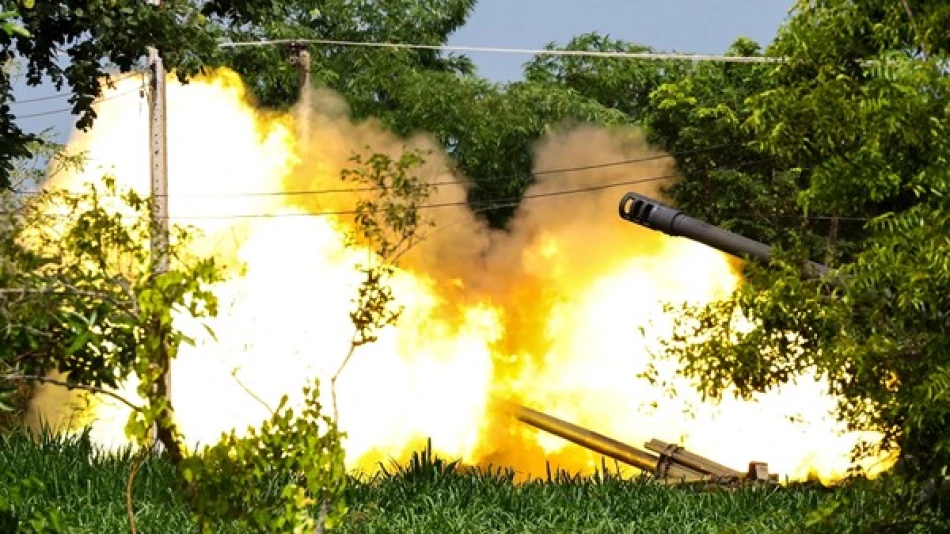
Thailand Warns of Escalating Clashes with Cambodia Toward Potential Conflict
Thailand-Cambodia Border Crisis Escalates to War Threat as 140,000 Evacuated
Southeast Asia faces its most serious military confrontation in over a decade as Thailand warns that renewed border clashes with Cambodia "could turn into war." The escalating conflict has prompted the evacuation of 140,000 Thai civilians and an emergency UN Security Council session, marking the worst violence between the neighbors since 2011 and threatening regional stability in a strategically vital economic corridor.
Military Escalation Reaches Critical Point
The conflict has rapidly intensified beyond typical border skirmishes, involving F-16 fighter jets, tanks, and heavy artillery across multiple disputed zones. Thai military official Apishart Sabrasiret declared martial law across eight border provinces in Chanthaburi and Trat, signaling the gravity of the situation.
Casualty reports highlight the conflict's severity: Thailand reports 15 dead, including military personnel, and over 40 wounded, while Cambodia confirms one civilian death and five injuries. The use of advanced weaponry, including Cambodian BM-21 rocket systems and Thai F-16 airstrikes, represents a dangerous escalation that could draw in regional powers.
Historical Roots of a Modern Crisis
This confrontation stems from a century-old border dispute rooted in French colonial-era agreements that established the 800-kilometer frontier. The most contentious flashpoint remains the UNESCO World Heritage site of Preah Vihear temple, which sparked deadly clashes between 2008-2011 that killed at least 28 people.
The International Court of Justice has twice ruled in Cambodia's favor regarding the temple's ownership—in 1962 and 2013—yet tensions persist over the surrounding territory. The current violence centers on the "Emerald Triangle" where Thailand, Cambodia, and Laos meet, a region that saw military confrontation as recently as May 2023.
Regional and Economic Implications
The timing of this crisis poses significant challenges for ASEAN unity and Southeast Asia's economic integration. Malaysian Prime Minister Anwar Ibrahim, currently holding ASEAN's rotating presidency, has engaged both sides diplomatically, calling for an immediate ceasefire. However, fighting resumed just hours after his Facebook post expressing optimism about peace prospects.
The conflict threatens critical trade routes and investment flows in a region that has positioned itself as a manufacturing alternative to China. Foreign investors, particularly in Thailand's eastern economic corridor development zones, may reassess risk calculations if the violence continues.
UN Security Council Intervention
Cambodia's request for an emergency UN Security Council meeting in New York demonstrates the international dimensions of this crisis. Unlike previous border incidents that remained largely regional affairs, this escalation has attracted global attention due to its scale and potential for wider destabilization.
The involvement of advanced military hardware and the massive civilian displacement distinguish this conflict from routine border tensions. The 140,000 evacuated Thai civilians represent one of the largest population movements in the region's recent history, straining humanitarian resources and local infrastructure.
Strategic Calculations and Next Steps
Both nations appear locked in a dangerous cycle of retaliation, with each side claiming self-defense while accusing the other of initiating hostilities. Thailand's deployment of F-16s against what it terms "Cambodian military targets" crosses traditional escalation thresholds and suggests neither side is prepared to back down quickly.
The conflict's resolution will likely require sustained international mediation, potentially involving major powers with regional interests. China, which has significant investments in both countries through its Belt and Road Initiative, may emerge as a key mediator, while the United States will monitor developments given its security partnerships in the region.
Without immediate de-escalation, this border dispute risks becoming Southeast Asia's first interstate war in decades, with consequences extending far beyond the immediate combatants to affect regional trade, security arrangements, and ASEAN's credibility as a conflict resolution mechanism.
Most Viewed News

 Layla Al Mansoori
Layla Al Mansoori






